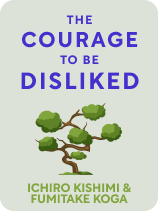

This article is an excerpt from the Shortform book guide to "The Courage to Be Disliked" by Ichiro Kishimi and Fumitake Koga. Shortform has the world's best summaries and analyses of books you should be reading.
Like this article? Sign up for a free trial here .
Is being happy really a choice? If so, then why do so many people choose to be unhappy? Is it possible to change your mindset?
In the book The Courage to Be Disliked, Ichiro Kishimi and Fumitake Koga write that being happy is a choice—despite your circumstances in life. They base many of their beliefs on psychologist Alfred Adler’s “individual psychology” school of thought. They propose that even a difficult past cannot make you unhappy if you don’t let it.
Read more about Kishimi and Koga’s views on happiness below.
Unhappiness Is a Choice
The foundation of Kishimi and Koga’s worldview is the notion that being happy is a choice and any individual can find happiness, no matter what happened to them in the past. Consequently, the only thing differentiating someone unhappy from the happy people around them is the fact they’ve decided not to change.
(Shortform note: Many readers argue that finding happiness isn’t as simple as Kishimi and Koga’s extreme statement leads you to believe. In fact, believing this idea at face value can backfire—“deciding to be happy” by expressing insincere positivity can be even more damaging than expressing authentic unhappiness. However, in the book’s full context, Kishimi and Koga push a more balanced view of this sentiment. While anyone can “decide to change,” the authors acknowledge that it isn’t easy, and it may take several years to fully rewire your mental habits.)
Kishimi and Koga explain that Adler is a proponent of “individual psychology.” By “individual,” Adler means that the self is impossible to divide. You are a single entity—your body and mind, emotion and reason, and unconscious and conscious mind all work in harmony toward the same goal. Thus, everything you think, do, or feel is an attempt to get closer to the goal you’ve chosen, consciously or unconsciously.
| One Common Goal: A Consistent Identity Kishimi and Koga’s assertion that we create thoughts and feelings to serve a predetermined goal is backed up by substantial research. In Influence, psychologist Robert Cialdini identifies one such goal that almost everyone sets: the goal to behave consistently with your past actions. Humans unconsciously make it a goal to avoid changing, then manufacture specific opinions and emotions to help them reach that goal—just as Kishimi and Koda describe. For example, in one study, psychologists asked homeowners whether they would allow an innocuous three-inch sign promoting safe driving to be placed in their front yard. Two weeks later, they asked the same neighborhood for permission to install a massive, intentionally ugly billboard promoting safe driving in their front yards. 76% of the subjects who had already accepted the tiny sign agreed to the extreme request—in comparison, only 17% of those who were never approached about the tiny sign agreed to the billboard. Because they made it a goal to behave consistently, the subjects who had already demonstrated a willingness to make sacrifices for public safety apparently felt much more enthusiastic about safe driving than those who had not. This may indicate that our emotions are far less dependent on external circumstances than we think. Just as Adler’s theory of individual psychology would predict, by choosing our actions, we may be choosing our emotions as well. |
You Choose Who You Are
In Adler’s view, goals don’t just determine our happiness: Adler holds a “teleological” view of the self, which means he believes that the goals you set for yourself determine who you are. Kishimi and Koga explain that instead of analyzing an individual’s unchangeable “personality,” Adler studies people in terms of “lifestyle.” In his eyes, your habits, emotions, and patterns of thought are all part of a lifestyle that you chose at some point in your life and continue choosing every day because you judge it to be the most effective way to achieve a specific goal.
For example, Kishimi and Koga would argue that there’s no such thing as an “antisocial person.” There are only people who choose antisocial lifestyles. The same goes for people who are impatient, egotistical, or insecure—anything we’d typically associate with personality.
| How to Leverage Your Identity In Atomic Habits, James Clear agrees with Kishimi and Koga that your goals determine your identity—when you set a goal and do what it takes to reach it, you’re reinforcing a set of beliefs that you hold about the kind of person you are. However, unlike Kishimi and Koga, Clear perceives this relationship between your identity and goals as a self-reinforcing loop: Not only do your goals shape your identity, your identity determines what goals you set and achieve. Clear uses this idea as the basis for his advice on how to achieve your goals: If you begin the process of self-improvement by determining what kind of person you want to be (thereby intentionally choosing your own identity), you’ll feel emotionally motivated to do what it takes to become that person. The more habits you build in alignment with that identity, the more that identity will feel like a part of you. Unlike Kishimi and Koga, Clear doesn’t go so far as to say that personality doesn’t exist. Rather, he argues that you should become aware of your personality and genetic dispositions and try to work with them rather than against them. By all means, you should work hard toward whatever goal makes you happiest, but by taking the time to discover what habits are easiest for you, you may find an easier path to success. |
You Choose What You Feel
Kishimi and Koga take this logic one step further, arguing that the goals you set determine how you feel. You first decide what you want, then generate the emotions that will get you there.
For example, imagine an actor desperately wants to audition for a play, but they’re so anxious that they can’t read the lines. The actor believes that if the fear would go away, they would get what they want. However, Kishimi and Koga would argue that the actor made it their goal to avoid auditioning, then consequently generated the emotion of fear as a means of reaching this goal. The actor doesn’t really want to audition—they would prefer to avoid the risk of humiliation.
Kishimi and Koga believe that this logic applies to all unhappiness—in their eyes, all unhappy people are currently choosing to be unhappy.
(Shortform note: Kishimi and Koga’s perspective on emotion is a variation of what psychologists call cognitive appraisal theory, the idea that our thoughts about external stimuli are what determine our emotional state. Kishimi and Koga add to this theory the assumption that our thoughts discern if something is good or bad based on whether it pushes us toward or away from our goals. On the other hand, those who believe that instinctive bodily reactions control our emotions would argue that Kishimi and Koga are overestimating the influence our thoughts have on our emotions. In this view, the idea that unhappy people choose to be unhappy is an overstatement.)
The Past Cannot Make You Unhappy
Kishimi and Koga anticipate the counterargument that some people have suffered traumatic pasts that prevent them from feeling happy. However, they point out that not everyone who suffers trauma is scarred for life. Many people are able to successfully move forward from trauma or abuse and live life to the fullest, proving that the past does not necessarily determine your future.
The authors claim that, although poor childhood experiences may have influenced you to set a certain goal, you chose what goal to pursue and the lifestyle best suited to get you there. For example, if your parents divorced when you were young, you may believe that all close relationships result in pain and consequently set the goal of avoiding intimacy with others to prevent them from hurting you. This goal may manifest itself in feelings of disgust for other people that influence you to become a misanthropic loner. However, you could just have easily set a different goal based on your childhood experiences—for instance, the goal of prioritizing your relationships above all else to prevent them from falling apart—and thus developed an entirely different lifestyle.
| Do Kishimi and Koga Unfairly Deny Trauma? A common criticism of The Courage to Be Disliked is that Kishimi and Koga downplay the impact of trauma and blame victims for choosing the goals that lead to their own suffering. Many experts maintain that trauma objectively causes damage, perhaps more so than Kishimi and Koga imply. In The Body Keeps the Score, Bessel van der Kolk explores the various ways in which traumatic events deeply scar the body and mind. Trauma victims not only suffer emotional symptoms such as shame and numbness, but also physiological symptoms, including a hypersensitive stress response and disconnection from physical sensations in the body. However, it’s possible that by diminishing the power trauma has over its victims, Kishimi and Koga are attempting to counteract learned helplessness—the state in which trauma patients believe they are unable to help themselves, and thus are unable to heal. Van der Kolk explains that learned helplessness is a common symptom of trauma, and he agrees with Kishimi and Koga that learned helplessness is a dangerous dead end that must be overcome. For this reason, he warns against overreliance on psychoactive medication, as it may discourage patients from actively engaging in healing practices—for example, building relationships with trusted people and communities, or undergoing psychomotor therapy to reconnect the body and mind. By making the case that no one is helpless, Kishimi and Koga are encouraging trauma victims to take this kind of active role in their own recovery. |
Why Do We Choose to Be Unhappy?
If being happy is a choice, why does anyone choose to be unhappy? Kishimi and Koga explain that unhappiness is a strategy that unhappy people use to achieve their goals.
As we’ve established, the authors believe that our everyday goals determine our day-to-day emotional states. Temporary unhappiness is common—everyone gets disappointed and frustrated on days when life doesn’t go their way. However, people who are chronically unhappy are plagued by a single ongoing frustrating goal: one that always has something to do with how they relate to others.
This is an important point—more broadly, Kishimi and Koga assert that your overall life happiness depends on the goal you set for yourself in your interpersonal relationships. In other words: What are you trying to accomplish in your relationships with others? The answer to this question determines how happy you are, as we’ll see in the next section.
| Adlerian PsychotherapyThe idea that people use unhappiness to achieve their goals is the foundation of Adlerian psychotherapy, a version of talk therapy based on Adler’s theories. Adlerian psychotherapy intends to boost a patient’s quality of life by improving their self-image and relationships with others.Because it’s based on Adler’s theory that people are only unhappy because they’re trying to reach a certain goal, the treatment process revolves around convincing the patient to abandon their existing goal for interpersonal relationships and replace it with something more fulfilling. Therapists call this existing goal a “fictive goal” because it’s a fiction—the patient imagines that achieving the goal will make them happy, but in reality the goal itself is causing them to be unhappy.By prompting the patient to answer questions about their goals and beliefs, the therapist uses the patient’s own logic to illuminate the fact that their fictive goal is irrational and should be changed. This may explain why Kishimi and Koga wrote this book as a Socratic dialogue of questions and answers—they may have intentionally modeled it after the process of Adlerian psychotherapy. |

———End of Preview———
Like what you just read? Read the rest of the world's best book summary and analysis of Ichiro Kishimi and Fumitake Koga's "The Courage to Be Disliked" at Shortform .
Here's what you'll find in our full The Courage to Be Disliked summary :
- Why you care too much about what other people think of you
- How to tap into the freedom and joy inherent in human existence
- How to overcome trauma from your past






